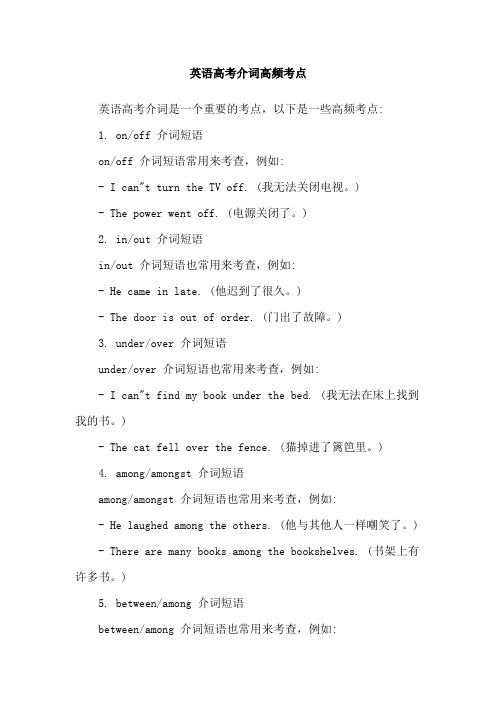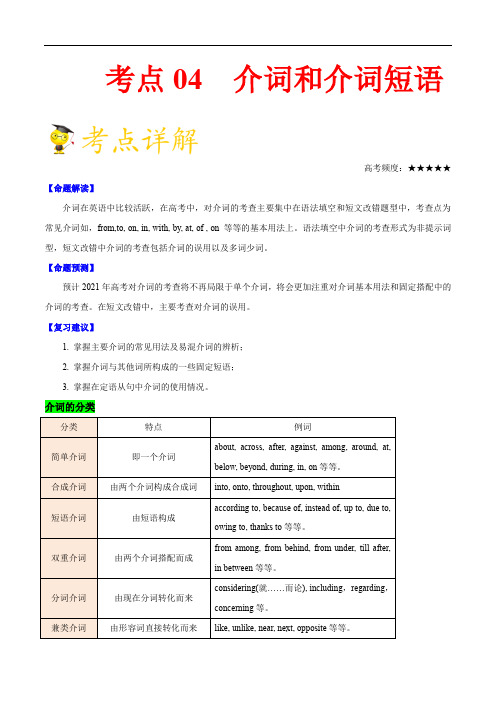高考介词常见考点例析
2023届高考英语语法知识:常用介词考点分析讲义

2023年高中英语语法知识精讲:常用介词考点分析一、shoot to, shoot at 及其他有网友问:在语法书和教辅书上,读到有关shoot to和shoot at 的区别,都说shoot to用于距离远、体积大的物体;shoot at用于距离近、体积小的物体。
请问,是这样的吗?这种说法很牵强,属于只看到现象,未触及本质。
用shoot to 还是shoot at与物体的远、近、大、小,没有直接的关系。
以下是我的理解和看法:shoot作“射击”讲,既是及物动词,也是不及物动词。
及物时表示“射中”,如:shoot the tiger(射中老虎);不及物时,跟不同介词搭配有不同的含义,例如:shoot at the wolf 朝着狼射击shoot to the woods 朝着森林方向射击shoot into the house 朝房内射击通过比较,我们发现:shoot本身没有变化,差别就在于,不同的介词有不同的含义。
at 表示“目标”;to表示“方向”;into表示“朝…….里面(有容积的物体)”。
所以,它们的区别与射击目标的“远、近、大、小”没有直接关系。
比方说,“朝着东方射击”,就用shoot to,因为to 表示“方向”,这时不能用at;wolf是目标就用at,但woods用at 就不合适。
类似的用法,也适应于look,point等词,请读者仔细体味:look at the blackboard (看黑板)look to the west(向西看)look into the water(向水里望去)point at the picture (指着图片)point to the wall (朝墙的方向指去)point into the sky(向空中指去)during the night与in the night的区别有朋友在本站“答疑中心”询问 during the night 与 in the night 的用法区别。
高考英语介词用法详解

高考英语介词用法详解一、单项选择介词1.Another study of 302 volunteers at hospitals in Chicago focused on individual differences inthe degree ______ people view“ volunteer” as an important social role.A. by which B. to which C. in which D. from which【答案】 B【分析】【详解】考察定语从句。
句意:另一项针对芝加哥医院302 名志愿者的研究集中在人们把“志愿者”视为重要社会角色的程度上的个体差别上。
剖析句子可知,本句是一个定语从句,此中先行词是 degree, to 与 degree 搭配,如: to some degree 在某种程度上,所以关系词在定语从句中作 to 的宾语,所以要用 to which 。
故 B 项正确。
2.The volunteers aim to help victims of disasters _____ their race or nationally.A.regardless of B. in spite ofC. on account of D. in charge of【答案】【分析】【详解】A考察介词短语词义辨析。
句意:志愿人员的目的是帮助灾害的受害者,不论他们的种族或国籍。
A. regardless of 不论,不管; B. in spite of 只管; C. on account of 因为; D. in charge of 负责。
应选 A。
3.Modern zoos should shoulder more social responsibility _______ social progress and awareness of the public.A. in light of C. in honor of 【答案】 A 【分析】【剖析】【详解】B.in favor of D. in praise of考察介词短语。
高考英语介词常见考点例析

f
|
B c u e t e od o e h sb e a g d e a s h l n a e n d ma e B. e o d r p i? b y n e a r
(08 苏 ) 20 江
A. e o d r a h b y n e c
.
1
“ 课本外、 考纲 内” 的词 汇, 于这类词 , 对 大家在平 时应 多多关注其用 法。 ( MayC ieeu i rie rv e coa hp r t et 2 n hn s nv sis oi dshlr iso u ns ) e t p d s f sd
A. n f v u f i a o ro B. n h n u f i o o r o C i a eo . n fc f D. n n e f i e do
A. n e B. t u dr wi h C. n o D. y b
【 分析 】 答案是 D 考查介词 的用法。借助 某种 方法和手段” 。 “ 常用“y , wf 强调使 用工具 , b”而“ i” h 常与 wtti i s hh
me o t d等搭 配。 h
() o aen e o h nse erl c 3 Y uhv oi ahw se ii dt e yr e— — d f h h a a
பைடு நூலகம்
§
。
r t譬 嚣
; 鬟 毪
i
| 。
ct i t fl ka e/ t l e oe、 k aeo、 r 等 。 a hs h 、o f r a/ i / vrt ecr ft nt c g o o t k a u o ( 一 Wh oyusget eb yanwmahn? 1 ) yd o ugs w u e cie
高考专题之介词考点梳理

高考专题之介词考点梳理一、方位介词1. 图解方位介词Be careful. There is a heavy box over your head.小心,你头上方有个很重的箱子。
The sun is above the mountain in the east.太阳就在那座山的上方。
There are some stamps on the desk.桌子上有一些邮票。
The position he pointed to was below the sea level.他所指的那个位置低于海平面。
The little mouse is under the table,so it is not easy to find it.那只小老鼠在桌子底下,因此很不容易找到它。
The Great Wall winds its way from west to east,across deserts,over mountains,through valleys,till at last it reaches the sea. 长城从西向东越过沙漠,跨过高山,穿过深谷,蜿蜒而行,最后直抵大海。
The crowd of people walked past the City Hall to the CenterSquare.一群人经过市政厅走到了中心广场。
It's quite beyond me why such things have been allowed to happen.我难以想象为什么能允许这样的事情发生。
【题组训练】完成句子:①The sunlight came in〔穿过〕the windows in the roofand lit up the whole room.②The bic ycle is 〔不能〕repair.③He hit his head〔对着〕the wall and hurt himself.①through ②beyond ③against2. at ,in.on三个词均可和表示地点的词连刖,表示“在……处〞。
英语高考介词高频考点

英语高考介词高频考点英语高考介词是一个重要的考点,以下是一些高频考点:1. on/off 介词短语on/off 介词短语常用来考查,例如:- I can"t turn the TV off. (我无法关闭电视。
)- The power went off. (电源关闭了。
)2. in/out 介词短语in/out 介词短语也常用来考查,例如:- He came in late. (他迟到了很久。
)- The door is out of order. (门出了故障。
)3. under/over 介词短语under/over 介词短语也常用来考查,例如:- I can"t find my book under the bed. (我无法在床上找到我的书。
)- The cat fell over the fence. (猫掉进了篱笆里。
)4. among/amongst 介词短语among/amongst 介词短语也常用来考查,例如:- He laughed among the others. (他与其他人一样嘲笑了。
) - There are many books among the bookshelves. (书架上有许多书。
)5. between/among 介词短语between/among 介词短语也常用来考查,例如:- I can"t find my keys between the sofa and the wall. (我无法在沙发和墙上找到我的钥匙。
)- The children played happily among the flowers. (孩子们在花丛中玩得很开心。
)这些介词短语在英语高考中常常会出现,考生需要熟练掌握它们的含义和用法,以便在考试中更好地应对。
高考英语介词和介词短语考点总结及真题解析

考点04 介词和介词短语高考频度:★★★★★【命题解读】介词在英语中比较活跃,在高考中,对介词的考查主要集中在语法填空和短文改错题型中,考查点为常见介词如,from,to, on, in, with, by, at, of , on 等等的基本用法上。
语法填空中介词的考查形式为非提示词型,短文改错中介词的考查包括介词的误用以及多词少词。
【命题预测】预计2021年高考对介词的考查将不再局限于单个介词,将会更加注重对介词基本用法和固定搭配中的介词的考查。
在短文改错中,主要考查对介词的误用。
【复习建议】1. 掌握主要介词的常见用法及易混介词的辨析;2. 掌握介词与其他词所构成的一些固定短语;3. 掌握在定语从句中介词的使用情况。
介词的分类考向①介词短语的功能介词不能独立在句中做成份,介词后必须与名词、代词、或动名词构成介词短语在句中充当一个成分,表示人、物、事件等与其它人、物、事件等之间的关系。
考向②常考介词的辨析介词是英语中最活跃的词类之一,使用频率相当高,其用法跟冠词一样复杂。
但根据近年来高考命题的情况来看,考生需要掌握以下内容。
1.表示相同或相似概念的介词(短语)的区别①at 8 o’clock, at noon②in the 1990s, in January③on Monday, on a warm morningon the①The lamp stands in the corner of theroom.②I me t with him at the street corner.③He sat on the corner of the table.besidesexceptbutexcept for1.(2020·新课标I卷短文改错)After that I poured oil into a pan and turned off the stove,I waited patiently unless the oil was hot.【答案】将off改为on【解析】考查介词。
高中英语高考语法专题:介词

in
表示在某段较长的时间内(如 世纪、年代、月份等)或泛指
上午、下午、晚上等
in December“在十二月”; in the morning“在上午”
(2)表示时间的 in 和 after
in after
意义
表示“在……时间之内/ 之后”,所在的句中必
须表示将来。
表示“在……时间之 后”,通常“after+时 间段”与过去时连用, “after+时间点”与将
He rowed me over to the other side of the lake.
Cover her over with a blanket.(adv.)
(4)against有“违背,违逆;反对;对……不利;倚;靠;碰撞; 预防;衬托;与…相比”之意。
Vacations help us perform better at work, improve our sleep quality and cushion us against depression.假期能帮助我们在工作中表现得 更好,提高我们的睡眠质量和缓解忧愁。
My father will be back after 3 o’clock.
My father came back here after 3 days/ 3 days after/ 3 days later.
(2) 当时间名词前面被 this, that, last, next, some, every, one…等词限定时,通常不用任何介词。
(3) For + 时间段,用与表示一个动作或行为状态 持续了多久。(并不一定用完成时)
(4) 时间段+ ago/ before
through across over
高考英语 介词考点归纳及语法填空

介词考点归纳语法填空对介词的考查点是:1、常见介词的基本用法;2、与介词构成的一些习惯搭配。
例如:I didn’t want to be laughed at for talking to him but I didn’t like leaving him 23 his own either.(2011,广东)一、介词的分类1.按结构分类from behind until after since before2.按意义分类(1)表示地点、方位的介词: _____________________________________________________①We’ll meet each other _____ the bus stop.②Mr. White lived ______ Hong Kong for 20 years.Shandong Province lies _______ the east of China.③The book you want is _____ the shelf.Mongolia lies ______ the north of China.Wuhan is located ______ the Yangtze River.④Shandong Province lies ______ the southeast of Hebei Province.⑤There is a bridge ______ the river.She put her letter _______ the pillow.The plane is flying ________ our heads.(2)表示时间的介词: _______________________________________________________________①______ noon; _______ night; _______ midnight; ______ dawn; _______ daybreak; ______ dusk;_____ sunrise; _______ sunset; ______ 6:35②_____ the Qin Dynasty; _______ the 1980s; ______ October; _____ the eveningI’ll be back ______ an hour.My father will be back ________ 5 o’clock.My mother came back 3 days ______.③______ National Day; ______ a rainy day; ______ Monday morning; ______ Thursday; _____ December 23rd; _______ the afternoon of January 22nd; ______ the eve of victory④______ the time he was five, he had learned 500 Chinese characters.He had collected 3000 stamps ______ last month.⑤Mr. Brown has lived in the countryside ______ almost fifteen years after his retirement.⑥We have lessons _______ 6:30 to 22:30 every day.⑦Linda has been doing her homework ______ 7 o’clock.(3)表示方式的介词: __________________________________________________①She cut the apple into four equal parts ______ a knife.We see ______ our eyes, hear _______ our ears, and walk ______ our legs.②He made a living ______ fishing.③You must write your composition _____ black ink.They can communicate with each other ______ English.固定结构:“用……方法”:________ this/that/the same way________ means of________ this/that means________ this/that method(4)表示交通/旅行的方式: _______________________________________________①______ water; ______ land; _______ air; ______ rail; _______ sea; ______ taxi; ______ spaceship;_____ plane; _______ train; ______ ship; _______ boat; _____ bike; ______ bus②I came here ____ a taxi.They left ______ a early train.He usually goes to school ______ his own bike, but today he went to school ______ foot.(5)表示“在……之间”的介词This secret is only __________ you and me.What’s the difference __________ the two words?We visited a small village __________ mountains last month.He divided his money __________ John, Helen and his nephew.(注:当句中出现divide, share等词时,如果后面跟着几个单数名词,则用between;如果后面是复数名词,between和among都可以。
- 1、下载文档前请自行甄别文档内容的完整性,平台不提供额外的编辑、内容补充、找答案等附加服务。
- 2、"仅部分预览"的文档,不可在线预览部分如存在完整性等问题,可反馈申请退款(可完整预览的文档不适用该条件!)。
- 3、如文档侵犯您的权益,请联系客服反馈,我们会尽快为您处理(人工客服工作时间:9:00-18:30)。
介词是英语中最活跃的词类之一,也是历年高考中涉及较多的考点,其用法变化多样。
高考对介词的考查主要是介词的基本用法和习惯搭配。
本文将以历年高考试题中的单项选择和短文改错为例,对高考介词常见考查要点进行简要分析。
一、高考单项选择题对介词的考查
(一)熟悉和掌握常考介词的基本用法
从历年高考题中可看出,介词类考题常集中于一些常用介词,如at ,in,for,from , to,of,on,with,until,about,by,since,as, around等。
当然,其他介词的用法也不能忽视。
1.He decides to visit the family ______ Friday night.(MET1988)
A.on B.at C.in D.during
解析:during the night,at night为泛指。
特指某个晚上,即night前有修饰语或其后有of短语时,则要用介词on。
本题特指星期五晚上,应选A。
2.Luckily,the bullet narrowly missed the captain ______ an inch.(NM ET2002)
A.by B.at C.to D.from
解析:答案A。
by用法之一是表示“相差……数目和程度”,如:His horse won by a nose.他的马以一鼻之差险胜。
题干意为:子弹以一英寸之差没射中上尉。
3.The doctor will be free ______ .(MET1992)
A.10minutes later B.after ten minutes C.in 10minutes D.10minutes after
解析:答案C。
in表示从现在到将来某段时间以后,而after表示某段时间以后。
4.The sunlight came in ______ windows in the roof and lit up the whole room.(上海2001)A.through B.across C.on D.over
解析:答案A。
through“穿过,通过(某地,某物)”,表示从事物的内部穿过;而across表示从事物表面穿过。
(二)熟悉和掌握常用的介词短语及其用法
这些介词短语,结构固定,含义特定,特别是有些介词与动词构成短语动词,要做到熟能生巧,运用自如。
如catch sight of,look after /at /like /over,take care of,turn to等。
1.In the dark street,there wasn't a single person ______ she could turn for help.(MET1992)A.to whom B.who C.from whom D.that
解析:答案为A。
turn to sb.for help为固定搭配,意为“向……寻求帮助”,题中turn后边的介词
to被移到了关系代词whom前面,形成“介词+关系代词”结构。
2.If you keep on,you'll succeed ______ .(NMET1993)
A.in time B.at one time C.at the same time D.on time
解析:答案A。
in time“及时,迟早相当于sooner or later“总有一天”;at one time“过去有一个时期”;at the same time“同时”;on time“准时”。
3.Washington,a state in the United States,was named ______ one of the greatest American presidents.(1999上海)
A.in honor of B.instead of C.in favor of D.by means of
解析:答案A。
in honor of“为纪念……,为向……表达”敬意。
(三)辨识介词在具体语境中的含义和用法,养成良好的思考习惯和提高辨识能力。
1.—What do you want ______ those old boxes
—To put things in when I move to the new flat.(2002北京)
A.by B.for C.of D.with
解析:答案D。
从答语中to put things in可知,those old boxes是用来作“工具,手段”的,即“你想用这些旧箱子来干什么
2.In the office I never seem to have time until after 5:30p.m., ______ many people have gone home.(上海1995)
A.whose time B.that C.on which D.by which time
解析:答案D。
此题与上题相似。
根据题意,定语从句中的时间状语应在5:30p.m.之前,所以应用“by the time...”结构。
3.The number of the employees has grown from 1,000to 1,200.The means it has risen ______ 20 percent.(上海1999)
A.by B.at C.to D.with
解析:答案A。
雇员的数量从1,000增长到1,200即意味“增长了”20%。
by表示“净增长或减少……”;而to表示“增长到……”。
4.—How long has this bookshop been business
— ______ 1982.(NMET1994)
A.After B.In C.From D.Since
解析:答案D。
after指时间时,表示“在……之后”;in表示“在……期间内”,在将来时态中表示“在……之间”;from强调“从……到……”;since表示“从……以来”,后接时间点,主句常用现在完成时。
二、高考短文改错题对介词的考查
(一)介词多余
1.I was so tired that I fell asleep at the moment my head touched the pillow.(NMET2002)去掉at。
句中the moment作连词,引导时间状语从句。
2.So I'm really sorry that I won't be able to come in this time.(NMET2000)去掉in。
this time前不要介词。
3.In fact,they're planning to visit China in next year.(NMET1996)
去掉in。
时间名词前有last,next等修饰时,不用介词。
4.I never knew about a ride down a river could be so exciting.(NMET1995)去掉about或about→that。
knew后直接跟宾语从句。
(二)介词错误
1.Unfortunately,there are too many peo- ple among my family.(1999)
among→in。
among在……之中;in在……里。
2.Newly-published novels are always in great demand and some books,for examples books for history,science,cooking and gardening are also popular.(1994)
for→ on。
表示“专论常用介词on,of等,如:on reading,of studies。
不用for和 about,about只是泛泛而论,表示的内容较普通。
3.When they came down the police were angry to them.(1992)
to→ with。
be angry with sb.是固定短语。
4.People in different parts in the world learn to understand one with another.(MET90)in→ of。
并去掉with。
of表示所属关系;one another为固定短语。
(三)介词缺少
1.I was happy with any programme but the others spent a lot time arguing...(NMET1999)
a lot后加of。
a lot of是固定词组。
2.We must keep in mind that we play for the team instead ourselves.(1998) instead后加of。
instead of是短语介词,“代替。
3.When I have free time I'll go a long walk.(1992)
go后加for。
go for a walk是固定短语。
